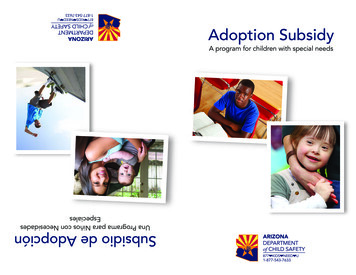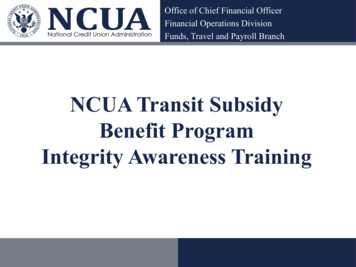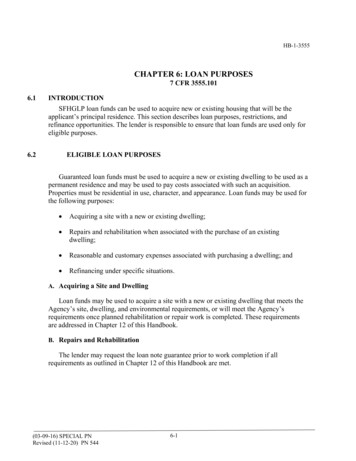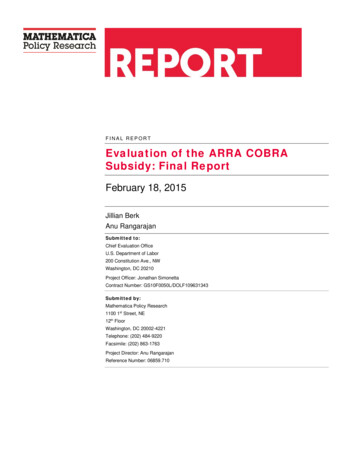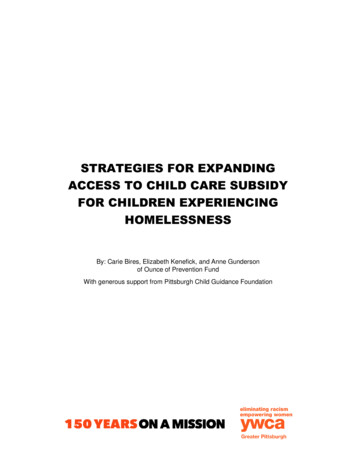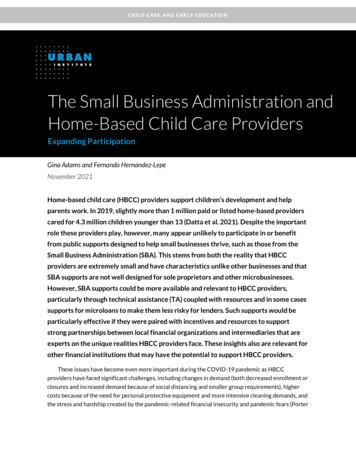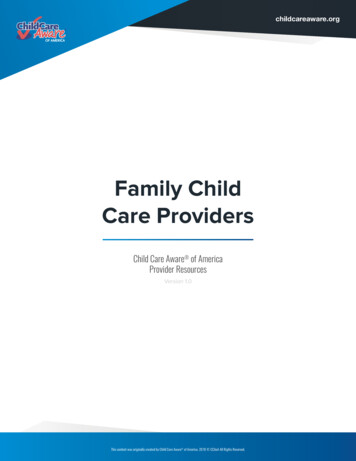
Transcription
Child Care Subsidy ProgramGuidance ManualDivision of Child Care and Early Childhood DevelopmentThis guidance for local departments is effective January 9, 2020.
Virginia Department of Social Services1/20Division of Child Care and Early Childhood DevelopmentChild Care Subsidy ProgramGuidance ManualTable of ContentsSection 1. Child Care Subsidy Overview . 1Definitions . 2Program Introduction . 16Section 2. Child Care Subsidy Program Categories . 212.1TANF Child Care Subsidy . 222.2Supplemental Nutrition Assistance Program Employment and Training(SNAPET) Child Care . 252.3TANF Transitional Child Care . 26Table of ContentsPage i
Virginia Department of Social ServicesDivision of Child Care and Early Childhood Development1/20Child Care Subsidy ProgramGuidance Manual2.4Head Start Wrap-Around Child Care. 292.5Fee Child Care Program . 322.672 Month Limit . 342.7Waiting List . 37Section 3. Case Management . 433.1Confidentiality . 44Table of ContentsPage ii
Virginia Department of Social ServicesDivision of Child Care and Early Childhood Development1/20Child Care Subsidy ProgramGuidance Manual3.2Application and Assessment . 473.3Non-Financial Eligibility Requirements. 543.4Cooperation with the Division of Child Support Enforcement (DCSE) . 63Table of ContentsPage iii
Virginia Department of Social ServicesDivision of Child Care and Early Childhood Development1/20Child Care Subsidy ProgramGuidance Manual3.5Income and Assets Eligibility Requirements . 783.6Copayments. 873.73.83.9Service Plan . 89Consumer Education . 90Parental Responsibilities. 92Table of ContentsPage iv
Virginia Department of Social ServicesDivision of Child Care and Early Childhood Development1/20Child Care Subsidy ProgramGuidance Manual3.10Local Department Contacts/Responsibilities. 953.11Forms Used In Service Planning . 1023.12Notice of Action (NOA). 1033.13Eligibility Period . 1053.14Authorization . 107Table of ContentsPage v
Virginia Department of Social ServicesDivision of Child Care and Early Childhood Development1/20Child Care Subsidy ProgramGuidance Manual3.15Payments . 1133.16Eligibility Redetermination. 117E.Income Limit at Redetermination .1203.17Suspension . 1213.18Closure . 1223.19Financial Management. 1243.20VaCMS and VaECC. 126Table of ContentsPage vi
Virginia Department of Social ServicesDivision of Child Care and Early Childhood Development1/20Child Care Subsidy ProgramGuidance ManualSection 4. Appeals, Fraud & Improper Payments . 1304.1Right to Appeals and Fair Hearings . 1314.2Fraud . 1354.3Administrative Disqualification Hearing . 1374.4Disqualifications . 144Table of ContentsPage vii
Virginia Department of Social ServicesDivision of Child Care and Early Childhood Development4.51/20Child Care Subsidy ProgramGuidance ManualImproper Payments . 146Section 5. Vendor Management . 1505.15.2Vendor Management . 151Parental Choice . 1535.3Regulatory Oversight of Vendors . 1545.45.55.6Vendor Approval Process . 157Background Checks . 160Additional Vendor Requirements . 1625.7VaECC and Vendor Attendance Tracking. 163Table of ContentsPage viii
Virginia Department of Social ServicesDivision of Child Care and Early Childhood Development1/20Child Care Subsidy ProgramGuidance Manual5.8Complaints in the Child Care Setting . 1655.9Vendor Fraud, Repayment, Disqualification & Appeals . 166Section 6. APPENDICES . 168Table of ContentsPage ix
Virginia Department of Social Services1/20Division of Child Care and Early Childhood DevelopmentSection 1.Child Care Subsidy ProgramGuidance ManualChild Care Subsidy OverviewSection 1: Child Care Subsidy OverviewPage 1
Virginia Department of Social ServicesDivision of Child Care and Early Childhood Development1/20Child Care Subsidy ProgramGuidance ManualDefinitions“Absence” means a day for which child care services have been authorized, and a childis expected to be in attendance, but is not.“Administrative delay” means the local department is unable to take action on anapplication within the 30-day application-processing period due to circumstancesbeyond their control.“Administrative Disqualification Hearing” (ADH) means an impartial review by a statehearing officer of a recipient's actions involving an alleged intentional programviolation for the purpose of determining if the individual did or did not commit anintentional program violation.“Appellant” means any applicant or recipient of child care services, or child care vendorwho provides child care services who has requested an appeal, or on whosebehalf an appeal request has been made.“Applicant” means a person who has applied for child care services and the dispositionof the application has not yet been determined.“Application date” means the date the signed application is received by the localdepartment. For applications received through CommonHelp after office hours,on weekends or on holidays, the application date is considered to be the nextbusiness day. Applications not received through CommonHelp must be datestamped upon receipt.“Approved” is a case status that means case eligibility has been established.“Approved activity” means the parent’s full-time or part-time employment, the parent’seducation or training leading to employment, the children’s need for childprotective services, or the VIEW/SNAPET assigned activity.“Assets” means resources owned by a person or company regarded as having valueand available to meet debts and commitments.“Assigned activity” for VIEW means participation in, but not limited to, job search,employment (subsidized or unsubsidized), Community Work Experience, on-thejob training, job skills training, job readiness training, education, internships, or apracticum in conjunction with work. A list of core work activities is found inChapter 1000 of the TANF manual. For SNAPET this means participation in acomponent listed on the SNAPET Plan of Participation.Section 1: Child Care Subsidy OverviewPage 2
Virginia Department of Social ServicesDivision of Child Care and Early Childhood Development1/20Child Care Subsidy ProgramGuidance Manual“Authorization” means a payment for child care services has been approved and fundshave been encumbered.“Authorization status” means the stage of an authorization in the Virginia CaseManagement System, such as Authorized, Discontinued, Suspended or WaitingList.“Authorized payment” means that a family has been found eligible to receive child careservices, a Purchase of Services Order has been initiated and signed by allparties, and payment may be made to the vendor for child care provided.“Background checks” means the checks for barrier crimes and offenses required underArticle 3, Chapter 17 or Title 63.2 of the Code of Virginia (§§ 63.2-1719 et seq.),including the sworn statement or affirmation as is required under Article 3, theCriminal History Record Check, and the Central Registry Child ProtectiveServices check.“Case status” means the status of a case in the Virginia Case Management System,such as Approved, Pending, Denied or Closed.“Case management services” means services that include, but are not limited to,application, assessment, eligibility determination, notices of action, consumereducation and/or service planning.“CCECD website” means the intranet web page for the Division of Child Care and EarlyChildhood Development at: https://fusion.dss.virginia.gov/ccecd/.“CCDF” means Child Care and Development Fund, the federal block grant for child careauthorized by the Personal Responsibility and Work Opportunity ReconciliationAct of 1996 and reauthorized by the Child Care and Development Block GrantAct of 2014.“Certified preschools” means preschool or nursery school programs operated by privateschools that are accredited by a statewide accrediting organization (or anotheraccrediting organization recognized by the Board of Education) and are certifiedby the Virginia Department of Social Services, Division of Licensing Programs.“Child Care Communication form” means the form used to request information from orto disseminate information to child care applicants/recipients for which the ChildCare Notice of Action is inappropriate."Child care services" means those activities that assist eligible low-income families inthe arrangement for and/or purchase of authorized child care for children for carethat is less than a 24-hour day. It also means activities that promote parentalSection 1: Child Care Subsidy OverviewPage 3
Virginia Department of Social ServicesDivision of Child Care and Early Childhood Development1/20Child Care Subsidy ProgramGuidance Manualchoice, that provide consumer education to help parents make informed choicesabout child care, that enhance health and safety standards established by thestate, and that increase and enhance child care and early childhood developmentresources in the community.“Child care subsidy” means authorized payments to vendors to assist eligible familieswith the cost of child care.“Child Care Subsidy Program” means the Department’s program that assists incomeeligible families with the cost of child care, including the TANF, SNAPET, HeadStart-Wrap-Around, Fee and Transitional program categories."Child care worker” means the worker designated by a local department of socialservices who provides case management services to applicants for andrecipients of the Child Care Subsidy Program."Child day center" means a child day program offered to two or more children under theage of 13 in a facility that is not the residence of the provider or of any of thechildren in care or 13 or more children at any location."Child day program" means a regularly operating service arrangement for childrenwhere, during the absence of a parent or guardian, a person or organization hasagreed to assume responsibility for the supervision, protection, and well-being ofa child under the age of 13 for less than a 24-hour period.“Child experiencing homelessness” means a child who lacks a fixed, regular, andadequate nighttime residence and includes:1. A child who is living in a car, park, public space, abandoned building,substandard housing, bus or train station, or similar settings;2. A child who is sharing the housing of other persons due to loss of housing,economic hardship, or a similar reason (sometimes referred to asdoubled-up);3. A child who is living in a motel, hotel, trailer park, or camping grounds dueto lack of alternative adequate accommodations;4. A child who is living in congregate, temporary, emergency or transitionalshelters;5. A child who is abandoned in a hospital;6. A child who is living in a primary nighttime residence that is a public orprivate place not designed for, or ordinarily used as, a regular sleepingaccommodation for human beings; and7. A child who is a migratory child as defined in §1309 of the Elementary andSecondary Education Act of 1965, P.L. 89-10 (20 USC § 6399) whoSection 1: Child Care Subsidy OverviewPage 4
Virginia Department of Social ServicesDivision of Child Care and Early Childhood Development1/20Child Care Subsidy ProgramGuidance Manualqualifies as homeless because he is living in circumstances describedabove."Child protective services” (CPS) means the identification of, receipt of, and immediateresponse to complaints and reports of alleged child abuse or neglect for childrenunder 18 years of age. It also includes assessment, and arranging for andproviding necessary protective and rehabilitative services for a child and hisfamily when the child has been found to have been abused or neglected or is atrisk of being abused or neglected.“Child with special needs or disability” means: (i) a child with a disability as defined in §602 of the Individuals with Disabilities Education Act (20 USC 1401); (ii) a childwho is eligible for early intervention services under part C of the Individuals withDisabilities Education Act (20 USC § 1431 et seq.); and (iii) a child who is lessthan 13 years of age and who is eligible for services under § 504 of theRehabilitation Act of 1973 (29 USC 794); and (iv) a child with a documenteddevelopmental disability, intellectual disability, emotional disturbance, sensory ormotor impairment, or significant chronic illness who requires special healthsurveillance or specialized programs, interventions, technologies, or facilities.“Closed” is a case status that means authorization has been terminated and the case isno longer eligible to receive child care services beyond the Notice of Actionperiod.“CommonHelp” means the website through which applicants can screen for potentialprogram eligibility, complete their child care application, and submit a child careapplication.“Conditional eligibility” means that eligibility has been approved for a period not toexceed 90 days to allow families with a child experiencing homelessnessadditional time to obtain required documentation needed to complete a finaleligibility determination."Cooperate with DCSE" means that an applicant or recipient must apply for childsupport services and participate and provide information, as requested by DCSE,to locate a non-custodial parent, establish paternity, to establish or modify a childsupport order, or enforce a child support order.“Copayment” means the amount paid to the provider by the parent to contribute towardthe cost of child care. Such amount shall be established by the department inaccordance with the current Child Care and Development Fund Plan for Virginia,approved by the U.S. Department of Health and Human Services. Copaymentsdo not include charges above the maximum reimbursable rate, or charges forregistration, activities or transportation.Section 1: Child Care Subsidy OverviewPage 5
Virginia Department of Social ServicesDivision of Child Care and Early Childhood Development1/20Child Care Subsidy ProgramGuidance Manual“Current VIEW Activity and Service Plan or SNAPET Plan of Participation” means theform which covers the period of child care service delivery and which serves asthe application for services for SNAPET and TANF recipients of Child CareSubsidy.“Denial” is a case action used, but not limited to, when an applicant or recipient is foundineligible, when an application is filed in error or voluntarily withdrawn by anapplicant, when an applicant moves from the locality, fails to complete theapplication process or submits a duplicate application prior to an eligibilitydetermination being made."Department" means the Virginia Department of Social Services.“Dependent care income disregard” means a certain amount of earned income used topay for child care, which is not taken into consideration when determiningeligibility for TANF benefits.“Disqualification” means the time period that recipients of child care or vendors arebarred from participating in the Child Care Subsidy Program due to a finding offraud, intentional program violation, or due to failure to repay an overpaymentaccording to the repayment schedule entered into with the local department.“Diversionary assistance” means a one-time lump sum payment to an individual or thirdparty vendor to prevent long-term receipt of TANF.“Division of Child Care and Early Childhood Development” (CCECD) is the division thatadministers the Child Care Subsidy Program and Virginia Quality, the state’squality rating and improvement system. It supports quality child care and a welltrained child care work force through training opportunities, and it houses theHead Start Collaboration office.“Early Head Start” means a family-focused child development program serving childrenfrom birth to three years of age under Section 645A of the Head Start Act."Education leading to employment" means the pursuit of basic remedial instruction toachieve a basic literacy level, instruction in English as a second language,preparation for GED or Adult Education, the completion of high school, associatedegree or certificate, work at the college level or bachelor degree from a collegeor university if the course of instruction is limited to a curriculum directly related tothe fulfillment of an individual's educational goal to obtain useful employment in arecognized profession or occupation.“Electronic Child Care” (VaECC) means the automated system used to recordattendance at child care vendors.Section 1: Child Care Subsidy OverviewPage 6
Virginia Department of Social ServicesDivision of Child Care and Early Childhood Development1/20Child Care Subsidy ProgramGuidance Manual“Eligibility period” means the minimum 12-month period an eligible recipient mayreceive services before eligibility is redetermined, despite any change inresidency within the State or any eligible child turning 13 years of age.“Eligible” means that the family has met all of the criteria to be approved for receipt ofchild care services.“Emancipated minor” means a juvenile under the age of 18, but above the age of 16who has been declared emancipated by a juvenile and domestic relations districtcourt according to the Code of Virginia §§ 16.1-331-334.1.“Ethnicity” is defined by the Department of Health and Human Services as Hispanic ornon-Hispanic."Exit eligibility limit" means the maximum gross countable income amount that a familycan receive to be considered income eligible at redetermination.“Family” means any individual, adult or adults and children related by blood, marriage,adoption, or an expression of kinship who function as a family unit."Family day home" means a child day program offered in the residence of the provideror the home of any of the children in care for one through 12 children under theage of 13, exclusive of the provider's own children and any children who reside inthe home, when at least one child receives care for compensation. The providerof a licensed or registered family day home shall disclose to the parents orguardians of children in their care the percentage of time per week that personsother than the provider will care for the children. Family day homes serving fivethrough 12 children, exclusive of the provider's own children and any childrenwho reside in the home, shall be licensed. However, no family day home shallcare for more than four children under the age of two, including the provider'sown children and any children who reside in the home, unless the family dayhome is licensed or voluntarily registered. However, a family day home where thechildren in care are all related to the provider by blood or marriage shall not berequired to be licensed. (Code of Virginia §63.2-100)."Family day system" means an organization that approves family day homes asmembers of its system; who refers children to available family day homes in thatsystem; and who, through contractual arrangement, may provide centraladministrative functions including, but not limited to, training of operators ofmember homes; technical assistance and consultation to operators of memberhomes; inspection, supervision, monitoring, and evaluation of member homes;and referral of children to available health and social services. Currently,“Infant/Toddler Family Day Care” serving Northern Virginia is the only licensedfamily day system in the state.Section 1: Child Care Subsidy OverviewPage 7
Virginia Department of Social ServicesDivision of Child Care and Early Childhood Development1/20Child Care Subsidy ProgramGuidance Manual“Federally regulated vendor” means a vendor regulated by the federal government,such as child care vendors operated by the Department of Defense on militarybases.“Federal poverty guidelines” means the income levels by family size, determined by theU.S. Department of Health and Human Services, used as guidelines indetermining at what level families in the country are living in poverty.“Fee” means a charge for a service and may include, but is not limited to, copayments,charges above the Maximum Reimbursable Rate (MRR), or charges forregistration, activities or transportation."Fee Child Care" means the program category that provides child care subsidy toeligible low-income, non-TANF families from the Child Care Development Fund.“File clearance” is the process initiated by the Child Care Worker that allows VaCMS tocheck SPIDeR for basic information to determine if an applicant/recipient isknown to any other systems which also publish to SPIDeR.“Finding of child care fraud” means the disposition of child care fraud by a state hearingofficer or a court of appropriate jurisdiction.“Fiscal year” means the local department financial calendar that begins in June of eachcalendar year and runs through May of the following calendar year.“Fraud” means the knowing employment of deception or suppression of truth in order toreceive services or payments one is not entitled to receive."Full-time employment" means regularly scheduled activities that engage a participant inemployment for 30 or more hours per week.“FUSION” means the Department’s intra-agency website."Good cause" means a valid reason as determined by the local department why (i) aparent in a two-parent household cannot provide the needed child care or (ii) whya parent will not be required to register with the Division of Child SupportEnforcement."Graduated phase-out" means the period of time for child care subsidy and services tocontinue as determined by the local department at redetermination for recipientswhose income exceeds the initial eligibility limit but is below the exit eligibilitylimit.“Head Start” means the comprehensive federal child development programs that servechildren from birth through age five, pregnant women, and their families (asSection 1: Child Care Subsidy OverviewPage 8
Virginia Department of Social ServicesDivision of Child Care and Early Childhood Development1/20Child Care Subsidy ProgramGuidance Manualestablished by the Head Start Act (42 USC § 9840)).“Head Start Wrap-Around” means the program category that pays for additional hoursbeyond those provided by Head Start/Early Head Start in order to provide fullday/full year child care services for Head Start/Early Head Start enrolled children.“Improper payment” means any payment that should not have been made or that wasmade in an incorrect amount. Incorrect amounts include overpayments andunderpayments. Overpayments and underpayments may include inappropriatedenial of payment or services, any payment made to an ineligible party, anypayments made for ineligible services, duplicate payments or payments forservices not rendered.“In loco parentis” means the adult(s) with whom a child is living who has assumedresponsibility for the day-to-day care and supervision of the child."Income eligible" means that eligibility for child care subsidy is based on income andfamily size.“In-home" means child care provided in the home of the child and parent when all thechildren in care reside in the home and the vendor does not live in the home."Initial eligibility limit" means the maximum gross countable income amount that a familycan receive to be considered income eligible at initial application.“Intake” is the process of obtaining and of recording the information necessary todetermine if a family is eligible to receive child care services.“Intentional program violation” (IPV) means any action by an individual for the purposeof establishing or maintaining the family’s eligibility for assistance under the ChildCare Subsidy Program or for increasing or preventing a reduction in the amountof the assistance by intentionally giving a false or misleading statement ormisrepresentation, concealment or withholding of facts or any act intended tomislead, misrepresent, conceal or withhold facts or propound a falsity.“Interactive voice response” (IVR) is the means by which recipients record attendanceusing the vendor’s telephone."Job search" means (for VIEW) a structured, time-limited period during which theparticipant is required to search for and/or obtain employment.“LEARNFARE” means child care services provided to a TANF minor parent to enablethem to attend school in compliance with compulsory school attendance laws.“Level 1 Vendor” means a child care provider that is not licensed by the Department orSection 1: Child Care Subsidy OverviewPage 9
Virginia Department of Social ServicesDivision of Child Care and Early Childhood Development1/20Child Care Subsidy ProgramGuidance Manualis not approved (i) by a licensed family day system, (ii) under a local ordinance inaccordance with §§ 15.2-741 and 15.2-914 of the Code of Virginia, or (iii) by thefederal government.“Level 2 Vendor” means a child care provider that is licensed by the Department or isapproved (i) by a licensed family day system, (ii) under local ordinance inaccordance with §§ 15.2-741 and 15.2-914 of the Code of Virginia, or (iii) by thefederal government.“Local department” means the department of social services of any county or city in theCommonwealth of Virginia.“Local government-approved recreation program” means a program of recreationalactivities offered by local governments, staffed by local government employees,attended by school-age children, and subject to safety and supervisory standardsestablished by local governments.“Local ordinance-approved provider” means a child care program approved under localordinance according to §§ 15.2-741 and 15.2-914 of the Code of Virginia.Currently, three localities (Fairfax, Alexandria, and Arlington) approve providersunder local ordinance.“Maximum Reimbursable Rate” (MRR) means the maximum rate paid for child careservices through the Child Care Subsidy Program that is established by theDepartment and set out in the state Child Care and Development Fund plan filedwith the United States Department of Health and Human Services."Noncustodial parent" means the parent who does not have primary care, custody, orcontrol of the child, and has the responsibility to pay child support. Also referredto as the obligor. The legal definition in Virginia's child support law is: "aresponsible person who is or may be obligated under Virginia law for support of adependent child or child's caretaker."“Non-fraud overpayment” means an overpayment that is the result of a local departmenterror, or an inadvertent household or vendor error.“Notice of Action” (NOA) is the form mailed to applicant/recipients providing informationrelated to eligibility, copayment or the amount of services authorized."On-the-job training" means training that is provided by an employer during the routineperformance of a job."Parent" m
Child Care Subsidy Program Guidance Manual Division of Child Care and Early Childhood Development This guidance for local departments is effective January 9, 2020. . providing necessary protective and rehabilitative services for a child and his family when the child has been found to have been abused or neglected or is at
